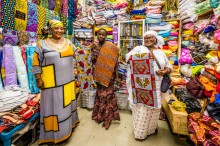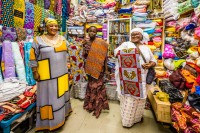Empowering women creates an equitable and just world

End-clients of Fin’Elle, Maimouna Dougan (left), her daughter Yasmine Doumbia Matenin Noura (middle) and sister Mariatou Dougan (right) showing off some of the wax prints in the fabric shop.
Women are at the heart of our communities, yet they continue to face a broad range of economic and social barriers. They have fewer opportunities for economic participation than men, lower access to basic and higher education, and they face greater health and safety risks.
Investing in women has been at the core of Oikocredit’s mission since our founding in 1975. That’s in line with our vision of a just society. We work closely with many partners who have a majority of women customers and help them expand their capabilities. Alongside, we recognise and advance the case that women need to present at the decision-making table.
The case for financial inclusion
The global gender gap stands at 68.4%, according to the World Economic Forum’s 2023 analysis of 146 countries. The report measured gender parity on four fronts, including economic participation and opportunity, education, health and survival, and political empowerment. At current rates of progress, closing the gap will take an estimated 131 years.
Research shows that women’s financial inclusion improves economic conditions for their families and for communities as a whole. Women tend to contribute larger portions of their income to household consumption than their male counterparts, the International Labour Organisation reports. Expanding women’s financial inclusion therefore also benefits households, communities and society.
When women fully participate in the economy, tangible results include job creation, innovation, improved productivity and sustainable economic growth, as well as delivering on women’s human rights. By one measure alone, advancing gender equality can increase gross domestic product (GDP). According to the European Institute for Gender Equality, per capita GDP could rise from 6.1% to 9.6%.
Closing the gender gap in OECD countries alone could give the global economy a US$ 7 trillion boost, according to Moody’s Analytics.
How Oikocredit helps empower women
Oikocredit actively contributes to the United Nations Sustainable Development Goals (SDGs) on a number of fronts. We are particularly active with respect to SDG 5, which aims to achieve gender equality and empower all women and girls.
We invest in and help build capacity for carefully selected partners in Latin America, Asia and Africa to promote women’s economic empowerment and narrow the gender gap in financial inclusion. When finalising partnerships, our due diligence assessment of potential partners applies gender-relevant indicators, such as a non-discrimination policy, women’s empowerment in the workplace and female representation at management and board levels.
We developed an environmental, social and governance (ESG) score that is in place since 2010 to streamline and harmonise the assessment of our partners’ social performance across the different teams, regions, and countries where we work. The first ESG score already considered elements of gender diversity and women representation at all levels within the organisations we work with.
Our 2023 Impact Report notes that 87% of the 42.2 million clients reached by our financial inclusion partners were women. In fact, gender equality is an objective for more than three-fourths (79%) of partners in financial inclusion (79%) and agriculture (77%) respectively.
An example of our recent work to advance gender parity is our recent investment in the first Diversity and Inclusion Social Bond issued in Ecuador by our long-time partner Cooperativa Jardín Azuayo, together with IDB Invest. This is the first bond in the world which has incentives linked to achieving social objectives, in terms of expanding financing to micro, small and medium-sized enterprises (MSMEs) led and/or owned by women, indigenous people, migrants, low-income people and/or people with low levels of education. Incentives include a monetary bonus if objectives are achieved, as well as advisory services, for example to assess and improve credit decisions towards women and underrepresented groups.
Elsewhere, we have been an early investor in the Indian financial technology platform Kaleidofin. The start-up uses digital technology to offer savings, loans, and insurance products to people with low incomes who are underserved by traditional financial institutions. About 98% of its customers are women.
And in Africa, Oikocredit became the first international lender to support the Fin’Elle, a microfinance institution in Côte d’Ivoire that focuses on providing microfinance and mesofinance loans to women-owned MSMEs. In 2021, Oikocredit agreed a loan of € 2.3 million to Fin’Elle.
As part of our capacity building outreach, we work to equip partner organisations with the tools they need to mainstream gender equality. Across our network, we helped build capacity at 67 organisations in 16 countries over the course of 2022.
With the Women’s Innovation for Sustainable Enterprises (Wise) project in Ghana, Oikocredit aims to increase access to economic empowerment, wellbeing and inclusive economic growth for women. Over two years, Oikocredit worked with a local consultant to train 31 staff from five financial inclusion partner organisations to create and improve financial products and services designed for approximately 12,000 women in the country’s Ahafo, Bono, Bono East and Northern regions. Despite a complex macroeconomic environment, the project has already reached 22% of its target audience with the aim of reaching more women over the coming months.
Advancing women’s leadership in the microfinance sector
The topics of gender diversity and women’s leadership at the institutional level are central to our engagement with partners. Women’s financial inclusion is a major subject in the data collection tools we have developed over the past decade. We also gather and communicate the business case for organisations to promote women’s leadership.
Women-run microfinance organisations are key to championing gender equality. About 34% of our microfinance partners have at least 50% of women in their leadership, and this share has been relatively stable over the past few years. In comparison, women held 21% of board seats and 19% of senior management roles within global financial services institutions in 2021.
Having more women leaders and more women in the workforce is not just something that is ‘nice to have’. Inclusive organisations attract and retain talent, and employees who feel truly valued are more satisfied with their jobs, which can boost productivity. A more diverse workforce enables more diverse views and experiences to be taken into account, which can help develop products that better fit customers’ needs.
Moreover, increasing women's presence in the leadership can influence organisations’ financial and commercial performance. Women’s leadership helps make organizations more client-centric, reduces portfolio risk and improves staff productivity and retention, among other effects.
Regression analysis of data collected from partners between 2012 and 2022 shows that, over the past few years, financial inclusion service providers with more women in leadership are significantly more likely to serve female clients, provide a wider range of products and services to their clients, and have poverty reduction as a social objective. Remarkably, the difference in desired outcomes and indicators of MFIs’ ability to serve their clients is only observed in organisations where women are represented at all levels of leadership, both board and senior management.
Clearly, gender diversity in leadership is correlated with indicators of good decisions for end-clients.
Committed to empowering women
Financial exclusion continues to remain an urgent issue, especially for women.
At Oikocredit, we envision a global, just society where resources are shared sustainably and all people are empowered with the choices they need to create a life of dignity. For nearly 50 years, we have recognised that women are essential to achieving that vision, and we remain committed to advancing gender diversity and inclusion across our work – by way of responsible investing, capacity building and promoting women’s leadership.
Arkiv > 2024 > mars
- 31 mars | 2024 - Oikocredit's new partnership with Patagonian Fruits supports Argentina’s fruit sector and builds climate resilience
- 28 mars | 2024 - Oikocredit and GAWA Capital provide equity finance for new generation microfinance company Sindhuja Microcredit
- 25 mars | 2024 - Oikocredit renews support to Leasafric Ghana with funding of GHS 10 million
- 21 mars | 2024 - Empowering women creates an equitable and just world
- 19 mars | 2024 - Strong common ground and commitment to further steps in NCP dialogue relating to microfinance loans in Cambodia
- 11 mars | 2024 - Oikocredit publishes latest Client Self-Perception Survey report after listening to more than 40,966 clients
- 08 mars | 2024 - Bridging the micro credit gap for Costa Rica’s women entrepreneurs

